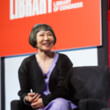The Tea Girl of Hummingbird Lane: A Novel
(Libby/OverDrive eBook, Kindle)
Available Platforms
Description
Excerpt
Similar Titles From NoveList
Similar Authors From NoveList
Published Reviews
Booklist Review
In a remote mountain village, the survival of an Akha tribe, one of China's 55 ethnic minorities, depends on tea. Rigid traditions prohibit Li-yan from keeping her newborn. She saves her daughter by leaving her in a nearby town, wrapped in blankets with a tea cake that hints at her distinctive heritage. Over the course of decades, See (China Dolls, 2014) reveals Li-yan's exceptional story of departure and eventual return. Interspersed with Li-yan's peripatetic experiences are those of her daughter, the titular tea girl, divulged by medical reports, letters, even the transcript of a group therapy session for adopted Chinese teens. See, herself partly of Chinese ancestry, creates a complex narrative that ambitiously includes China's political and economic transformation, little-known cultural history, the intricate challenges of transracial adoption, and an insightful overview of the global implications of specialized teas. The only possible flaw is that some may consider her magic-wand ending unbelievable. As this is her first book since losing her own mother, bestselling author Carolyn See (to whom it is dedicated), See's focus on the unbreakable bonds between mothers and daughters, by birth and by circumstance, becomes an extraordinary homage to unconditional love. HIGH-DEMAND BACKSTORY: Bestselling See's latest will be vigorously promoted on all platforms as she meets readers on a 10-city tour.--Hong, Terry Copyright 2016 Booklist
Publisher's Weekly Review
Miles reads most of the novel in the role of Li-yan, a girl of the Akha, one of China's 55 ethnic minority groups. She works well as a breathy 10-year-old, but doesn't seem to mature much in voice or tone as listeners follow Li-yan through her painful teen and beyond as she becomes an accomplished adult. The novel provides excellent detail about the Akhas' eked-out life in their mountain home, tea culture, gender roles, and folk beliefs in the pre- and post-Deng Xiaoping eras. It then contrasts all this sharply with the life of Li-yan's abandoned daughter, Haley, and other adopted Chinese girls spoiled by American parents. Several other actors-Alexandra Allwine, Jeremy Bobb, Kimiko Glenn, Joy Osmanski, Emily Walton, Erin Wilhelmi, and Gabra Zackman-lend their voices for these secondary characters. Their performances are all strong, and the variety helps listens stay attuned through a long story. A Scribner hardcover. (Mar.) © Copyright PWxyz, LLC. All rights reserved.
Library Journal Review
Ruthie Ann Miles and Kimiko Glenn bring to life the mother/daughter voices that drive See's (China Dolls) new novel. Knowing her unborn child faces infanticide by the Akha, an ethnic minority in Yunnan, China, teenage Li-yan gives birth in a secret tea grove aided by her mother, a local midwife. She then determines to leave her daughter at an orphanage. When her circumstances change, she attempts to retrieve her daughter but learns that the child has been adopted and lives in America. Juxtaposed are the stories of the mother's rise as a dealer in the valuable pu'er tea trade and that of the daughter's coming to terms with being adopted and learning about her roots. -VERDICT Recommended for those who want a taste of anthropology with their fiction and those who enjoy stories of mothers and daughters. ["See deftly confronts the changing role of minority women, majority-minority relations, East-West adoption, and the economy of tea in modern China": LJ 1/17 review of the Scribner hc.]-David Faucheux, Lafayette, LA © Copyright 2017. Library Journals LLC, a wholly owned subsidiary of Media Source, Inc. No redistribution permitted.
Kirkus Book Review
A woman from the Akha tribe of China's Yunnan province becomes a tea entrepreneur as her daughter grows up in California.See explores another facet of Chinese culture, one that readers may find obscure but intriguing. Li-Yan, the only daughter of a tea-growing family, is a child of the Akha "ethnic minority," as groups in China who are not of the Han majority are known. The Akha are governed by their beliefs in spirits, cleansing rituals, taboos, and the dictates of village shamans. As a teenager, circa 1988, Li-Yan witnesses the death of newborn twins, killed by their father as custom requires, because the Akha consider twin-ship a birth defect: such infants are branded "human rejects." The Akha, inhabiting rugged, inaccessible terrain, have avoided the full brunt of China's experiments in social engineering, including the Great Leap Forward and its resultant famine, the Cultural Revolution, and the One Child policy. Li-Yan's family harvests mostly from wild tea trees as opposed to terraced bushes, and their product is discovered by a connoisseur, Huang, who will alter Li-Yan's destiny. The Akha encourage youthful sexual experimentation, but progeny outside marriage are automatically "rejects." So when Li-Yan discovers she is pregnant by her absent fiance, San-pa, she hides, with her mother's help, in the secret grove of ancient tea trees which is her birthright. After the infant is born, Li-Yan journeys on foot to a town where she gives up her child. Over the next 20 years, we follow Li-Yan as she marries and is widowed, escapes her village, becomes a tea seller, and marries a wealthy recycling mogul, Jin. The couple moves to Pasadena. Intermittent dispatches inform readers that, unbeknownst to Li-Yan, her daughter, named Haley by her adoptive parents, is also in Pasadena. Haley's challenges as a privileged American daughter pale in contrast to Li-Yan's far more elemental concerns. Although representing exhaustive research on See's part, and certainly engrossing, the extensive elucidation of international adoption, tea arcana, and Akha lore threatens to overwhelm the human drama. Still, a riveting exercise in fictional anthropology. Copyright Kirkus Reviews, used with permission.
Booklist Reviews
In a remote mountain village, the survival of an Akha tribe, one of China's 55 ethnic minorities, depends on tea. Rigid traditions prohibit Li-yan from keeping her newborn. She saves her daughter by leaving her in a nearby town, wrapped in blankets with a tea cake that hints at her distinctive heritage. Over the course of decades, See (China Dolls, 2014) reveals Li-yan's exceptional story of departure and eventual return. Interspersed with Li-yan's peripatetic experiences are those of her daughter, the titular tea girl, divulged by medical reports, letters, even the transcript of a group therapy session for adopted Chinese teens. See, herself partly of Chinese ancestry, creates a complex narrative that ambitiously includes China's political and economic transformation, little-known cultural history, the intricate challenges of transracial adoption, and an insightful overview of the global implications of specialized teas. The only possible flaw is that some may consider her magic-wand ending unbelievable. As this is her first book since losing her own mother, bestselling author Carolyn See (to whom it is dedicated), See's focus on the unbreakable bonds between mothers and daughters, by birth and by circumstance, becomes an extraordinary homage to unconditional love. HIGH-DEMAND BACKSTORY: Bestselling See's latest will be vigorously promoted on all platforms as she meets readers on a 10-city tour. Copyright 2016 Booklist Reviews.
Library Journal Reviews
In a new novel that's classic See, Li-yan is one of the few young women beginning to move beyond the confines of her mountain village. Still, she can't keep the baby she has out of wedlock, instead wrapping her up and leaving her in a nearby city. While Li-yan enters modern life and daughter Haley, rescued and adopted, grows up a happy California girl, each wonders about the other. With a ten-city tour.. Copyright 2016 Library Journal.
Library Journal Reviews
The adage, "No coincidence, no story," from China's Akha minority serves as the backbone for this latest offering from See (Shanghai Girls). Coincidences abound in this illuminating novel that contributes historical and social insight into the Akhas, an animistic people who lived modestly and virtually untouched by modernity in the mountains of China, and tea production in an increasingly globalized world. A growing taste for pu'er, a rare tea, has led entrepreneurs to seek out the ancient crop cultivated in remote Yunnan. Li-Yan, the intelligent but rash daughter of a village midwife, serves as the link between one such entrepreneur and her people, transforming their way of life. Against tradition, she later bears a daughter out of wedlock and gives up the child for adoption at her mother's urging. Banished and broken, Li-Yan tries to navigate modern Chinese life while her daughter is raised by loving Caucasian parents in an upper middle-class California home. Neither time nor distance can vanquish their yearning to be reunited. VERDICT With strong female characters, See deftly confronts the changing role of minority women, majority-minority relations, East-West adoption, and the economy of tea in modern China. Fans of See's Snow Flower and the Secret Fan will appreciate this novel. [See Prepub Alert, 9/26/16.]—Suzanne Im, Los Angeles P.L.
Copyright 2017 Library Journal.Publishers Weekly Reviews
Li-Yan is the youngest daughter of an Ahka family near Nannuo Mountain in China in 1949. She tries to follow Ahka law, the rules set forth by the beliefs of this ethnic minority, but at every turn she seems to find herself doing the opposite: An Ahka girl must obey and learn from her mother, but Li-Yan studies hard at a modern school. Although an Ahka girl should not speak to men, when foreigners arrive from Hong Kong in search of a renowned, aged tea called Pu'er, Li-Yan is the only one who can translate. If an Ahka girl gets pregnant, she must marry the boy, but when Li-Yan gives birth, the father is gone. And, according to Ahka law, a child born outside of marriage must be killed. But Li-Yan cannot bring herself to do it. Instead, she leaves her daughter at the doorstep of an orphanage. While Li-Yan matures into a successful tea master, the daughter, Haley, is adopted into a white American family in Los Angeles, and her existence is revealed in sporadic letters, school reports, and, later, emails. These sections capture both Haley's desire to fully integrate into her adopted family and her curiosity and heartache about her mother and the only clue she left behind: a tea cake. With vivid and precise details about tea and life in rural China, Li-Yan's gripping journey to find her daughter comes alive. (Mar.)
Copyright 2017 Publisher Weekly.Reviews from GoodReads
Citations
See, L. (2017). The Tea Girl of Hummingbird Lane: A Novel . Scribner.
Chicago / Turabian - Author Date Citation, 17th Edition (style guide)See, Lisa. 2017. The Tea Girl of Hummingbird Lane: A Novel. Scribner.
Chicago / Turabian - Humanities (Notes and Bibliography) Citation, 17th Edition (style guide)See, Lisa. The Tea Girl of Hummingbird Lane: A Novel Scribner, 2017.
Harvard Citation (style guide)See, L. (2017). The tea girl of hummingbird lane: a novel. Scribner.
MLA Citation, 9th Edition (style guide)See, Lisa. The Tea Girl of Hummingbird Lane: A Novel Scribner, 2017.
Copy Details
| Collection | Owned | Available | Number of Holds |
|---|---|---|---|
| Libby | 2 | 0 | 10 |

































